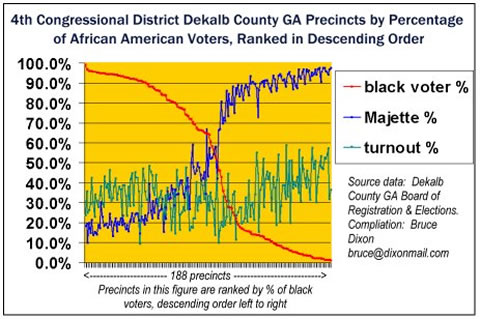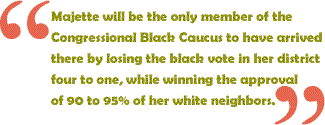The
Atlanta Journal-Constitution's accounts of the Cynthia McKinney
- Denise Majette congressional primary race, which have served as
the basis for widespread claims that Black voters are becoming more
conservative, are bogus inventions, indefensible by any demographic
and statistical standards. Denise Majette's claims to substantial
African American support in the August election, as well as the
political conclusions offered by the newspaper and the many media
outlets that have cited its reports, are based on phantom voters,
wishful thinking and phony numbers - lies made of whole cloth.

A
comprehensive analysis of precinct-by-precinct returns for the recent
election, along with DeKalb County GA's official statistics on voters
by race in each precinct, reveals the following:
1.
Denise Majette's share of the black turnout
in the open primary was less than 20%, or between 10 and 12,000
votes, far less than the Atlanta Journal-Constitution's "18,000
black voters who made up one-fourth of Majette's total [based
on] vote totals in predominantly black voting precincts."
(see footnote 1)
2.
Rather than being elected by a "biracial
coalition of voters," Denise Majette was the beneficiary
of an abnormally large white turnout, which she carried at a rate
of 90% or better. This "biracial coalition," hailed
in the Washington Post (see footnote 2), the Journal-Constitution
and elsewhere, is revealed on close inspection to be less like
a patchwork quilt and more like a big white sheet.
3.
The oft-told tale that the election results
"confirm the emergence of moderate middle class and affluent
African-Americans as an independent political base" (see
footnote 3) is a demonstrable lie supported by neither the election
returns nor the demographic data.
This
Big Lie, that Majette's campaign assembled a "biracial coalition"
incorporating substantial numbers of comfortably well-off African
Americans ready to back a new and more "centrist" black
leadership with their votes, has been widely quoted, repeatedly
referenced and relentlessly recycled by the Washington Post and
New York Times, by NPR, CBS, Fox News, and CNN, and by dozens of
other print, broadcast and internet "news" sites in a
manner more akin to the dissemination of urban myths and rumors
than to any pretense of journalistic integrity, objectivity or fact-checking.
Re-tellers of the tale like the Washington Post's Tony Neal frequently
establish or bolster their credentials by embellishing upon it still
further. Professional "observers" of the black political
scene like Clark Atlanta University political science Professor
William Boone gain national recognition by validating a "biracial
coalition" that never existed. (see footnote 4)
By
now, so many "journalists" and pundits of every stripe
have uncritically repeated the canard that it threatens to become
the commonly accepted wisdom. Fortunately for us, the lie is easily
debunked.
Hard
numbers and accepted statistical methods provide no evidence in
"predominantly black precincts" of sufficient black Majette
voters to indicate a new, rightward trend in DeKalb County, Georgia
- much less to extrapolate for the rest of black America. The Majette
vote closely tracks the white voter population through the district,
never varying more than 18% from its white base. Finally, in the
whitest regions of the district, the white voter statistics and
the Majette vote virtually converge.
Figure
1, below, graphically depicts all of the district's
precincts in the descending order of their percentage of black voters
(red line) and the corresponding Majette vote (blue line). The green
line is voter turnout. There is an inverse relationship between
the percentage of black voters and the percentage of votes cast
for Denise Majette.

Figure
2, below: This tight racial voting pattern
is consistent in racially mixed areas. To demonstrate the true racial
voting pattern in DeKalb County - as opposed to the anecdotal and
imaginary "trends" promulgated by the Majette forces and
her media patrons -  divided the district into ten nearly equal groupings, or "deciles,"
of precincts, in descending order of Black population. (See Figure
2.) Only in decile 5, consisting of precincts with an average of
72.7% Black population, did the gap between white voters and Majette
voters widen rather than continue towards ultimate convergence,
and even then only marginally, at at 18%. McKinney won 58.4% of
that decile.
divided the district into ten nearly equal groupings, or "deciles,"
of precincts, in descending order of Black population. (See Figure
2.) Only in decile 5, consisting of precincts with an average of
72.7% Black population, did the gap between white voters and Majette
voters widen rather than continue towards ultimate convergence,
and even then only marginally, at at 18%. McKinney won 58.4% of
that decile.
|
Decile
|
total
eligible
voters
|
white voter
%
|
black voter
%
|
Majette %
|
McKinney %
|
turnout %
|
|
1
|
34,784
|
3.9%
|
94.2%
|
18.5%
|
81.5%
|
32.6%
|
|
2
|
35,003
|
5.4%
|
92.7%
|
20.1%
|
79.9%
|
34.7%
|
|
3
|
33,705
|
9.2%
|
88.5%
|
25.5%
|
74.5%
|
36.9%
|
|
4
|
32,337
|
15.0%
|
82.1%
|
30.1%
|
69.9%
|
28.3%
|
|
5
|
33,890
|
23.6%
|
72.7%
|
41.6%
|
58.4%
|
26.5%
|
|
6
|
33,575
|
39.0%
|
56.0%
|
52.0%
|
48.0%
|
27.0%
|
|
7
|
33,361
|
72.7%
|
20.4%
|
83.9%
|
16.1%
|
27.1%
|
|
8
|
33,713
|
82.7%
|
11.7%
|
89.6%
|
10.4%
|
35.3%
|
|
9
|
35,491
|
90.4%
|
5.3%
|
92.5%
|
7.5%
|
40.0%
|
|
10
|
37,543
|
94.7%
|
2.0%
|
95.2%
|
4.8%
|
45.3%
|
|
(see footnote 5)
When
the district's precincts are ranked by % of black voters
and divided into 10 equally weighted segments or deciles,
the only trends visible are
(1)
candidate preferences overwhelming follow racial percentages,
(2)
district's lowest turnouts are found in integrated precincts
including those in the 60% and below black range carried
by Majette, and
(3)
district's highest turnout rates occurred where population
is 85% or more white, where Majette won 90-95% of the vote.
(see footnote 4)
|
This
spread - beginning at around 16% and narrowing as precincts whiten,
with a small bump in the middle - accounts for virtually all of
the Black Majette vote. It is the salient fact that any demographer
or statistician would immediately note as the defining characteristic
of the election. It represents a numerical finger, pointing and
shouting out "Liar!" at the reality re-write men of the
Atlanta Journal-Constitution.

Since
raw racial segregation leaves little room for numbers mischief at
the ethnic extremes of the district - in overwhelmingly Black deciles
1, 2 and 3 and ever-whiter deciles 8, 9 and 10 - the electoral alchemists
at the AJC appear to be inferring strong Black Majette turnouts
in the precincts of the middle deciles 4, 5, 6 and 7, hidden, somehow,
by the integrated surroundings. Yet the racial pattern remains constant.
In fact, the only distinguishing characteristic of the middle deciles
is their dramatically lower voter turnout, compared to the whiter
and blacker areas of the district. (See Turnout column in Figure
2, and the green line in Figure 3.) In these shrunken voter pools,
there is nowhere to infer Majette's legions of African American
supporters, unless one supposes that within these precincts are
found corresponding hordes of die-hard white McKinney supporters.
If
we are to believe the AJC's statistical slight of hand, we must
swallow all three of the following assumptions:
- that
black Majette supporters in racially integrated precincts went
for Majette in far higher proportion than black voters anywhere
else
- that
these same black Majette supporters came out in far higher
proportion than their white neighbors in those same precincts
- since
McKinney got a sizeable number of votes in those same precincts,
while the AJC assigned Majette most of the black votes, white
voters in those precincts must have come out for McKinney in
suspiciously high numbers.
Each
of these assumptions is dubious; together, they are fantastical.
Majette
carried only a single 70% black precinct, and another that was 64%
black. Where the percentage of black voters falls below 64%, Majette
won all but one of them, a function of the racial spread in the
voter turnout. In the 30 Dekalb County precincts that have 93% or
more black voters, Majette garnered only 19% of the vote. Applying
this voter turnout and preference pattern consistently across the
district's black voting population yields Denise Majette an absolute
maximum of 10 to 12,000 black votes, 6 to 8,000 short of the Atlanta
Journal-Constitution's "findings."
Figure 3, below, shows the
direct correlation between the percentage of white voters and the
percentage of the vote received by Denise Majette in that precinct,
conclusively demolishing the Majette claim of substantial black
support anywhere in the 4th Congressional district.

 Upon
reaching the 75% white precincts, the gap between Majette's percentage
of the vote and the percentage of white voters converges. Above
90% white, Majette's tally closely matches the percentage of white
voters, having crept upward to an astounding 95% per precinct of
votes cast.
Upon
reaching the 75% white precincts, the gap between Majette's percentage
of the vote and the percentage of white voters converges. Above
90% white, Majette's tally closely matches the percentage of white
voters, having crept upward to an astounding 95% per precinct of
votes cast.
To
repeat, there is absolutely no numerical, no statistical, no factual
evidence that Denise Majette's victory was based on the relatively
small proportion of black votes she received. The affluent, centrist
black voters who, we were told, flocked to her cause and were key
to her victory are another urban myth. Majette was sent to Washington
by an overwhelming turnout of white voters who supported her at
a rate of over 90%.
We
at The Black Commentator searched the election returns in vain for
signs of the "18,000 black voters who made up one-fourth of
Majette's total," as proclaimed by Ben Smith and David Milliron
in the Atlanta Journal-Constitution on October 14. Their conclusions
depend upon the votes of people that never were; black and white
ghosts, inhabiting "predominantly black voting precincts"
that must be invented to accommodate a fictional political class
of conservative black voters. For perhaps the first time in history,
a significant white southern institution has resorted to, in effect,
padding the black voter rolls!
The
AJC, which led the Majette propaganda blitz that passed for "news"
during the campaign, declined to spoil their spurious fairy tale
with real statistics. Little wonder. To remedy this deficiency,
 herewith provides a link to the complete election returns and racial
data by precinct derived from the DeKalb County Board of Registration
and Elections, at end of this analysis.
herewith provides a link to the complete election returns and racial
data by precinct derived from the DeKalb County Board of Registration
and Elections, at end of this analysis.
There
is no emerging cohort of black, centrist leaning voters. The figures
are public, a link to the precinct-by-precinct stats is provided
at the end of this analysis and we challenge the Drs. Bullock and
Boone, at the University of Georgia and Clark Atlanta, along with
their colleagues in the press, to show otherwise. It's an urban
myth, concocted and spread by the AJC, the Washington Post, Fox
News, NPR and other news and opinion outlets. Neither McKinney nor
Majette constructed a "biracial coalition" for this election.
Four-fifths of the black vote went to McKinney and 90-95% of the
white vote to Majette. Whites turned out in bigger numbers, and
their candidate won. Only this time, the candidate of the old white
"solid South" is expected to join the Congressional Black
Caucus amid a cloud of baseless obfuscation about a statistically
invisible stratum of middle-class "conservative black voters"
having elected her.
The
very idea can be seen as part of an ongoing campaign to deny the
existence of and invalidate the operations of what we at Black Commentator
call the Black Consensus. When we're excoriated for describing Colin
Powell as a "house slave" or Clarence Thomas as an "Uncle
Tom" we are being denied the language to describe our common
perceptions, our common predicaments, experiences and opinions.
On the flip side, America's corporate media freely declare into
existence a fictive stratum of colored folk among us with media-invented
characteristics.
 You
can repeat an urban myth long enough and often enough to make some
people believe it. But you can't tell it enough times to make it
true. When Denise Majette goes to Congress she goes not as the representative
of the imaginary new school of conservative-leaning affluent suburban
black voters. She does not go as the result of any biracial coalition
among the divergent communities that exist in the 4th district.
Majette lost four-fifths of the black vote, but won 90%-95% of a
strong white turnout in her district. Majette benefited from an
unprecedented campaign of vilification against incumbent Cynthia
McKinney, waged by allies and supporters of President Bush, from
right wing talk radio hosts to reporters and pundits, who unanimously
painted her as unprincipled, unbalanced, unpatriotic, a black racist
and anti-Semite, an unapologetic supporter of "terrorism".
This, along with a campaign specifically directed toward mobilizing
the largest possible white vote, put Denise Majette in Congress
and on the Congressional Black Caucus.
You
can repeat an urban myth long enough and often enough to make some
people believe it. But you can't tell it enough times to make it
true. When Denise Majette goes to Congress she goes not as the representative
of the imaginary new school of conservative-leaning affluent suburban
black voters. She does not go as the result of any biracial coalition
among the divergent communities that exist in the 4th district.
Majette lost four-fifths of the black vote, but won 90%-95% of a
strong white turnout in her district. Majette benefited from an
unprecedented campaign of vilification against incumbent Cynthia
McKinney, waged by allies and supporters of President Bush, from
right wing talk radio hosts to reporters and pundits, who unanimously
painted her as unprincipled, unbalanced, unpatriotic, a black racist
and anti-Semite, an unapologetic supporter of "terrorism".
This, along with a campaign specifically directed toward mobilizing
the largest possible white vote, put Denise Majette in Congress
and on the Congressional Black Caucus.
Majette
will be the only member of the Congressional Black Caucus to have
arrived there by losing the black vote in her district four to one,
while winning the approval of 90 to 95% of her white neighbors.
When she takes a seat alongside authentic progressive legislators
like Maxine Waters and Barbara Lee, in the same room with Bobby
Rush and Jesse Jackson Jr., Danny Davis and others, she can be expected
to represent the coalition that put her in office. And that coalition
does not look like the real America. On the Black Caucus, Denise
Majette's presence is an abomination. She is the epitome of the
Trojan Horse in our midst. Like Clarence Thomas, who declines invitations
to most social events due to his well-founded fear of public embarrassment,
she ought to be shunned and shamed at every opportunity.
Bruce
A. Dixon can be contacted at [email protected].
Mr. Dixon has compiled additional, important information on the
contest in Georgia's 4th congressional district. Visit his web sit
by clicking
here.
 makes available to its readers the complete precinct-by-precinct
election results and demographic data used in this article. Click
on the link below to read the data in PDF file format. http://www.blackcommentator.com/DekalbCountyGA_ByPrecinct_082002.pdf
makes available to its readers the complete precinct-by-precinct
election results and demographic data used in this article. Click
on the link below to read the data in PDF file format. http://www.blackcommentator.com/DekalbCountyGA_ByPrecinct_082002.pdf
Reading
the data requiers the Adobe Acrobat Reader. If you do not have the
Acrobat Reader, please click on this link to get a free copy. http://www.adobe.com/products/acrobat/readstep2.html
Footnotes:
1
- Vote Analysis: GOP Not Key To McKinney Loss,
by Ben Smith and David Milliron in the Atlanta Journal Constitution
October 15. http://www.accessatlanta.com/ajc/metro/election2002/1015mckinney.html
2
- "The
politics of polarization finally caught up with her, and she was
defeated by a candidate who was able to build a biracial coalition,"
said University of Georgia political scientist Charles Bullock.
"Bullock said McKinney's defeat also shows how much the Atlanta-based
district has grown -- an effect that has diluted McKinney's original
base.
"'She never adjusted to the changes of the district that elected
her,' he said."
http://www.washingtonpost.com/ac2/wp-dyn?pagename=article&node=&contentId=A43977-2002Aug21¬Found=true
3
- The unresearched and unsupported assertion first
appears in a Ben Smith story "How Majette Beat McKinney: in
the August 22 Atlanta Journal-Constitution http://www.accessatlanta.com/ajc/metro/election2002/22fourth.html.
It was immediately picked up and repeated and embellished upon by
Terry Neal in the Washington Post "McKinney's Loss Points to
Larger Change: Moderate Black Politicians Continue Historical Rise
http://www.washingtonpost.com/ac2/wp-dyn?pagename=article&node=&contentId=A53533-2002Aug23¬Found=true
4
- "There was a change in DeKalb, and Cynthia
didn't pick up on it," said William Boone, a political scientist
at historically Black Clark Atlanta University. "There's a
growing Black middle class here, a middle class that is much, much
different from the Black middle class of the civil rights era. Cynthia
had the civil-rights-era politics down pat. But the voters were
looking for someone more focused in the issues, not just someone
who is Black and will look out for them." Associated Press,
August 22, 2002.
http://www.arizonarepublic.com/news/articles/0822mckinney22.html
5
- Georgia lists voters who have not voted in consecutive recent
elections as "inactive" but still keeps them on the rolls
for a limited time. Turnout figures in this analysis are based on
a percentage of the "active and inactive" voters, since
any "inactive" voter in Georgia is permitted to walk in
and cast a ballot on election day, and in fact thousands did exactly
that in this election. The racial percentages released by election
authorities in this contest include "inactive" as well
as "active' voters.

Your comments are welcome. Visit the
Contact Us page for E-mail or Feedback.

